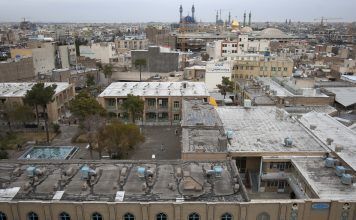By Kayhan Life Staff
A mobile phone provider known as the Kourosh Company has allegedly embezzled nearly $35 million after claiming to import mobile phones below the official market price. The scandal has once again brought to light rampant corruption in the Islamic Republic.
The embezzlement, which is said to have left 200,000 individuals with lost property, was orchestrated by the company’s young manager, who reportedly fled the country after the scandal came to light.
The Kourosh Company — registered under Kourosh Pardazan EyeSaa in 2021 by Amir Hossein Sharifian as the CEO and Khatereh Gharadaghi – allegedly offered iPhones at significantly lower prices by eliminating intermediaries and ensuring delivery within 45 days.
Some 200,000 individuals are reported to have fallen victim to the Kourosh Company’s misleading advertising, which included leveraging the influence of celebrities to coax unsuspecting customers into purchasing iPhones at below-market prices.
Amir Hossein Sharifian, born in 1997, completed his initial military service of 180 days, but reportedly refused to join the army for further service. Instead, he was reported “absent without leave” (AWOL) in 2022.
According to the Tehran-based Didban Iran news website, Mr. Sharifian reportedly aligned himself with respected government organizations and religious institutions to leverage their reputation and influence to enhance his standing and credibility.
How the company’s website secured a business license is a question for the officials at the Ministry of Industry, Mine and Trade, according to the Didban website.
Some have argued that the 27-year-old Sharifian could not have managed the company’s extensive advertising campaigns alone, as a substantial financial investment in marketing and promotion was needed. The extensive advertising campaign required massive resources.
These allegations suggest that there were potential irregularities in the company’s operations, which could indicate a breach of import regulations and questionable connections with governmental entities.
In an interview with the Iranian Students News Agency (ISNA), Mehdi Assadi, the head of the Mobile, Tablet, and Accessories Importers Association, said: “The company in question did not possess a license to import iPhones, and instead relied on domestic importers to get these devices. The company’s office, which had been shut down twice, was mysteriously reopened for unknown reasons.”
One of the company’s key tactics was securing celebrity endorsements to attract more victims. Celebrities from various fields, including artists and athletes, were used to promote the company and encourage individuals to invest money with the expectation of receiving an iPhone at a lower price.
The Kourosh Company is facing multiple complaints from alleged victims who claim to have lost money in the scam, which involved the sale of 20 million iPhones. Many of these victims have filed complaints against the company, some also suing the celebrities who endorsed or promoted the company.
The victims argue that the involvement of celebrities and athletes in the company’s advertising campaigns convinced them to trust the Kourosh Company.
Abolfazl Nasiri, the director of the State Organization for Registration of Deeds and Properties’ Office for Registration of Companies and Non-Commercial Institutions, has said that no entity under the name “Kourosh Company” has been legally registered.
According to Mr. Nasiri, Amir Hossein Sharifian had registered a company under the name “Kourosh Pardazan EyeSaa,” but there is no mention of an entity named “Kourosh Company” in any legal documents.
Nasiri added that until April of last year, approximately seven to eight individuals had joined and left the management team of “Kourosh Pardazan EyeSaa” company. Eventually, Mr. Goudarzi was elected as the CEO, and Amir Hossein Sharifian became the leading member of the board of directors.
Alsamad Khorramshahi, a senior law attorney (solicitor), told ISNA that when a company is involved in illegal activities, those who knowingly or unknowingly assist it could be held liable.
Mr. Khorramshahi noted that the CEO of Kourosh Company, if arrested and tried in Iran, would likely receive a 10-year sentence.
“It is unlikely for any cash to be recovered if a person is arrested and extradited to Iran, even if Interpol is involved, because these individuals rarely hold on to the money they have received through illegal means,” Khorramshahi explained.
Khorramshahi noted that, while holding criminals accountable for their actions is essential, the punishment for bribery, embezzlement, and fraud perpetrators can include imprisonment for up to 10 years.
Victims of a fraud scheme have no recourse when the perpetrators are found to have no assets, which could have dire consequences on society.
Khorramshahi highlighted the prevalent issue of large-scale fraud in various sectors, such as cars and housing, leading to significant financial losses for victims.
“The perpetrators of these frauds often evade justice, leaving the victims without recourse,” He explained. “Where the criminals are apprehended, the recovery of the stolen money is not always guaranteed, further exacerbating the plight of the victims.”
According to Khorramshahi, the prevalence of fraud in various fields, including its occurrence with an “official and legal appearance,” can be attributed to inefficient laws and the structure of government-created systems.
Hossein Selahvarzi, the former head of the Iranian Chamber of Commerce, made a thought-provoking comparison on “X” (formerly known as Twitter) regarding individuals who fall victim to Ponzi schemes, explicitly mentioning the Kourosh Company’s scheme.
In his tweet, Selahvarzi likened these individuals to those who sell assets received through non-productive means, relying on chance or speculation instead.
The remarks made by Selahvarzi, as reported by the Tehran-based Doniya-e Eghtesad newspaper, shed light on the decision-making process within the automobile sector.
The newspaper highlighted a concerning trend where individuals are easily swayed by the allure of purchasing low-cost cars or mobile phones. This phenomenon is attributed to the repeated profit-making schemes prevalent in the industry.
The article suggests that consumers may fall prey to deceptive marketing tactics because of their exposure to various profit-driven practices and intermediaries within the sector.
“Politicians, through their decisions, might prompt people to buy goods at a low price and sell them at a higher price in the open market to make a profit,” the paper said.
The paper noted that the significant price difference of sometimes up to 100 percent between the factory and the market is common in various industries. This price gap often results from multiple factors, including supply chain inefficiencies, distribution costs, market demand, and the role of intermediaries and brokers, who make significant profits to the detriment of some industries.
The situation regarding imported cars has significantly improved, with some buyers even profiting from these vehicles. The problem can be attributed to the points system associated with buying imported cars. Under this system, buyers receive points for each imported car they purchase.
These points have increased in value over time, resulting in significant financial gains for those who invest in imported cars. Some buyers have seen their initial $9,000 deposit grow into several million dollars thanks to the accumulation of points.
Selling car remittances is prevalent in some cities where businesses place ads saying, “We can buy your car remittance.” Various factors, such as economic conditions, consumer behavior, and market demand, often drive this phenomenon. Car remittances refer to transferring vehicle ownership from one individual to another.
Kourosh Company allegedly received significant amounts from people who needed proper oversight from trade unions or law enforcement. One notable detail is that this company was granted an “electronic trust symbol” known as “Enamad,” enabling it to conduct e-commerce.
The electronic trust symbol “Enamad” is given to internet stores by the Electronic Commerce Development Center, which operates under the auspices of the Iranian Ministry of Industry and Mine and Trade.
Reza Ghorbani, the head of the FinTech Commission of the Nasr Organization of Tehran and a financial technology expert, has emphasized that the primary responsibility for incidents related to financial crimes rests with the regulatory bodies of the government and the Judiciary in Iran.
Mr. Ghorbani mentioned two key entities that should be accountable for preventing such crimes: the Deputy of Social Affairs and Crime Prevention within the Judiciary and the Prevention Police Department in the Law Enforcement Command of the Islamic Republic of Iran (FARAJA.)
“Trade unions such as the Union of Computer Technicians, the Union of E-commerce, and other relevant organizations play a crucial role in addressing issues related to the regulation and management of internet trading,” Ghorbani noted. “What do they have to say about this situation?”
Government officials have not commented widely on the alleged fraud case.
Davoud Manzoor, head of the Plan and Budget Organization (PBO), said: “I read somewhere that in recent years, 32 cases of fraud like the Kourosh Company have occurred and 220,000 people have been scammed. Be careful with your investments.”
“Ponzi schemes are usually carried out with the promise of high profits as investment schemes, network marketing companies, and digital currencies,” Mr. Manzoor added.
Based on reports, the Kourosh Company has allegedly been involved in a significant fraud case that has resulted in many people losing large sums of money. Those wishing to file a complaint against the company must pay a £4 registration fee. Over 200 thousand people have reportedly lost money, and if every one of them were to file a complaint against the company, the total cost would be £800,000.














